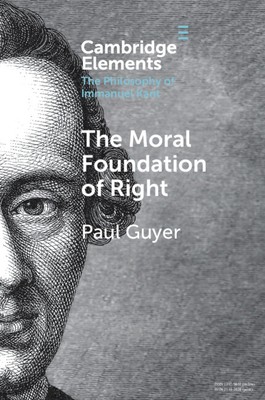
- We will send in 10–14 business days.
- Author: Paul Guyer
- Publisher: Cambridge University Press
- ISBN-10: 1009464493
- ISBN-13: 9781009464499
- Format: 15.2 x 22.9 x 0.4 cm, softcover
- Language: English
- SAVE -10% with code: EXTRA
Reviews
Description
Kant defined 'Right' (Recht) as the condition that obtains among a population of physically embodied persons capable of setting their own ends who live on a finite surface and therefore cannot avoid interaction with each other if each is as free to set their own ends as is consistent with the freedom of all to do the same. He regarded this rational idea, heir to the traditional idea of 'natural Right, as the test of the legitimacy of the laws of any actual state, or 'positive Right.' He clearly considered Right to be part of morality as a whole, namely the coercively enforceable part, as contrasted to Ethics, which is the non-coercively enforceable part of morality. Some have questioned whether Right is part of morality, but this Element shows how Kant's "Universal Principle of Right" follows straightforwardly from the foundational idea of Kant's moral philosophy as a whole.
EXTRA 10 % discount with code: EXTRA
The promotion ends in 19d.18:12:38
The discount code is valid when purchasing from 10 €. Discounts do not stack.
- Author: Paul Guyer
- Publisher: Cambridge University Press
- ISBN-10: 1009464493
- ISBN-13: 9781009464499
- Format: 15.2 x 22.9 x 0.4 cm, softcover
- Language: English English
Kant defined 'Right' (Recht) as the condition that obtains among a population of physically embodied persons capable of setting their own ends who live on a finite surface and therefore cannot avoid interaction with each other if each is as free to set their own ends as is consistent with the freedom of all to do the same. He regarded this rational idea, heir to the traditional idea of 'natural Right, as the test of the legitimacy of the laws of any actual state, or 'positive Right.' He clearly considered Right to be part of morality as a whole, namely the coercively enforceable part, as contrasted to Ethics, which is the non-coercively enforceable part of morality. Some have questioned whether Right is part of morality, but this Element shows how Kant's "Universal Principle of Right" follows straightforwardly from the foundational idea of Kant's moral philosophy as a whole.


Reviews